I’ve always known English, the language, was a bit of an oddity. Quirky. Downright weird even. But, not until I was managing two copywriting projects simultaneously across two drastically different time zones did I realise the extent of the malady (Check out the video at the end of this post).

One was a US-based client and the other Brit. Each have their own take on the Queen’s English and Grammarly, my digital writing tool that uses artificial intelligence and natural language processing, literally crashed two weeks into this nightmare!
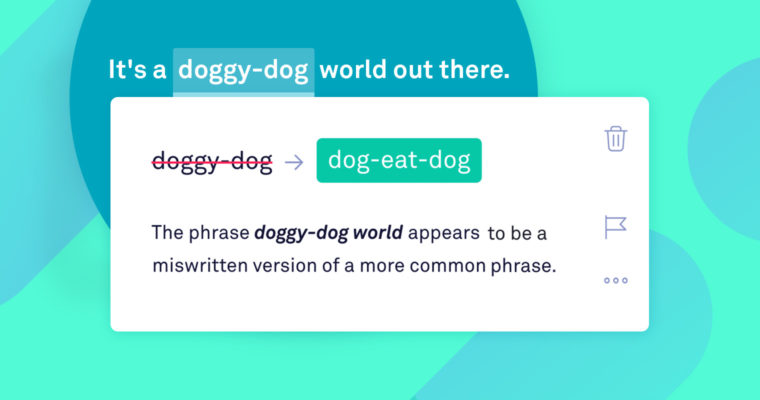
For a normal language, spelling at least pretends a basic correspondence to the way people pronounce the words. But no, English is not normal.
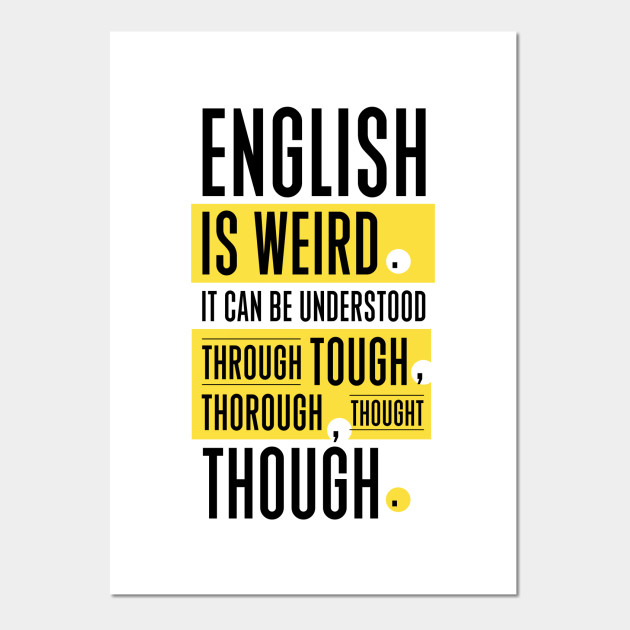
It is among the hardest languages to learn. Even native English speakers have trouble with it. Words change meaning over time, and words that are spelled similarly don’t always rhyme.
Becoming fluent in English can be tricky! English’s crazy vocabulary is almost definitely to blame.
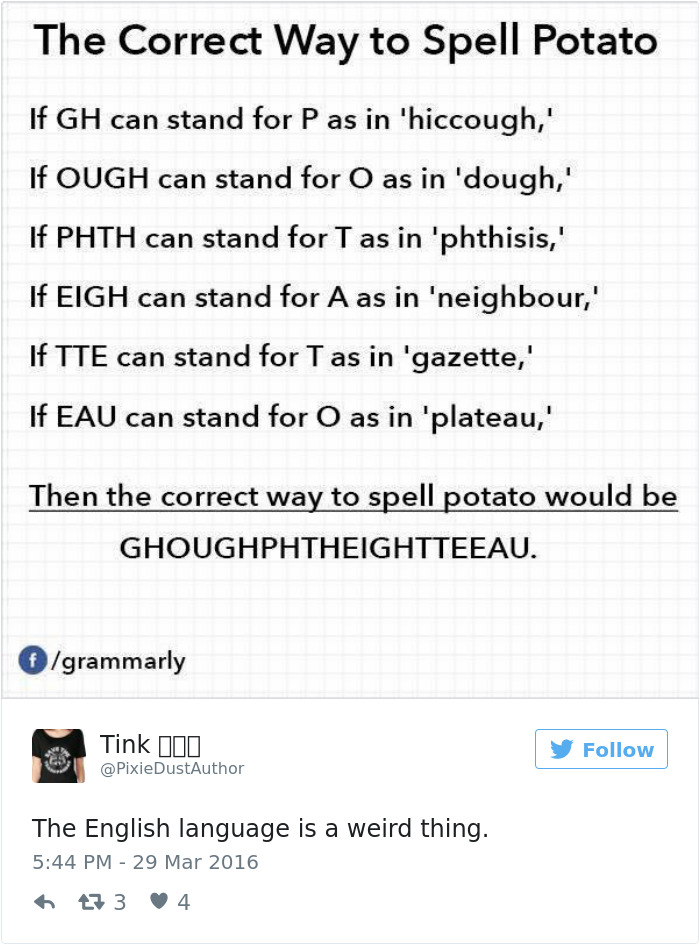
Even in its spoken form, English is weird in ways that are easy to miss, especially since Brits and Americans aren’t usually multi linguists.
Words that look the same can be pronounced differently, and words that sound the same can be spelled differently.
Some letters are silent and don’t like to sing, they are there but are quiet, and don’t say a thing.

Try explaining the complex spelling rules of the language, or the meanings of idioms such as “it’s raining cats and dogs” to someone who is learning English. You’ll get what I’m saying..
Here are some anomalies of the language that highlight how difficult it is to master.
English is full of contronyms — words that have two opposite meanings.
If you clip something, are you cutting it or attaching it together? If something is transparent, is it invisible or obvious? The answer, confusingly, could be either one.
A “contronym” is a word that has two contradictory meanings, and the English language is full of them.
It is also full of homographs – words that are spelled the same, and even often pronounced the same, but mean different things.
There’s tear (to rip) and tear (as in crying), bass (a type of fish) and bass (a low sound), bat (a piece of sports equipment) and bat (an animal), bow (a type of knot) and bow (to incline) to name a few.
The English language is full of homographs.
Idioms often make no sense.
Why does “it’s raining cats and dogs” mean that it’s raining hard? Why is an easy thing considered “a piece of cake?” The English language is full of phrases that confuse non-native speakers.
“I before E except after C” is a lie.
You may have heard the little ditty of “I before E except after C, or when sounded as ‘a’ as in ‘neighbor’ and ‘weigh,'” but it has too many exceptions to be considered a good rule of thumb.
Merriam Webster debunked this myth with satirical jingle of its own:
“Though,” “through,” “thorough,” “thought,” “tough,” and “trough” all mean different things and are pronounced differently.
Walking through a tunnel. Not “thorough.”
Six letters, apparently infinite combinations.
The meaning of words can change depending on which syllable is stressed.
According to linguist Jakub Marian, if the stress is on the second syllable, it usually becomes a verb. For example, an ADDress is the place where someone lives. To addRESS someone is to talk to them.
Irregular plural words don’t have an S at the end.
“Child” becomes “children.” “Person” becomes “people.” “Tooth” becomes “teeth.” “Foot” becomes “feet.” The list goes on.
Homophones — different words that sound the same — are hard.
Homophones are words that have different meanings but sound the same. For example, “worn” can mean that something is worn out and weathered, and “warn,” pronounced the same way, is to caution someone.
One artist even created 300 homophone illustrations to help people visualize this phenomenon.
Words are spelled in counterintuitive ways with silent letters.
Some words begin with silent letters, like “knight,” others have them in the middle, like “Wednesday,” and some have them towards the end, like “reign.”
A new children’s book called “P is for Pterodactyl” pokes fun at English words with silent letters and bizarre spellings.
Even if you can spell a word correctly, you might be saying it wrong.
Widely used pronunciations can be completely wrong. For example, “mischievous” is often pronounced “miss-chee-vee-us,” but the correct way is “miss-chiv-us.”
Even native English speakers mess up “who” and “whom.”
Here’s a trick: if you can replace the word with “he,” “she,” or “they,” use “who.” (Who wants to go to the park? He/she/they want to go to the park.)
If you can replace the word with “him,” “her,” or “them,” use “whom.” (Whom did you see at the park? You saw him/her/them.). – Courtesy Insider

German and Dutch are like that, as are Spanish and Portuguese, or Thai and Lao. The closest an Anglophone can get is with the obscure Northern European language called Frisian.

A few more interestingly weird facts.
THE MOST COMMONLY USED WORD IS “I”.
It’s also the oldest and shortest word in the english language.
THE WORD “GIRL” WAS ONCE GENDER NEUTRAL.
At one point during the evolution of the english language, “girl” meant child, or young person, rather than indicating a specific gender.
THE POPULAR RULE FOR USING “A” AND “AN” IS WRONG.
Most people learn that you should use “a” before words that start with a consonant, and “an” before words that start with a vowel. That’s actually not quite right. The real rule is to use “a” before words that starts with a consonant, and “an” before words that start with a vowel sound.
Ex. I just need an hour more before I run my errands.

THE AMERICAN REVOLUTION IS WHY WE HAVE “COLOR” AND NOT “COLOUR”.
After winning our independence from Britain, Americans felt the obvious next step was to differentiate our language. Noah Webster led this crusade, urging Americans to be free from “the clamor of pedantry” that plagued British spelling. This mostly meant removing what he thought of as unnecessary letters in certain words like “colour”, “programme” and “catalogue”. The first American dictionary (complete with new spellings) was published in 1806.
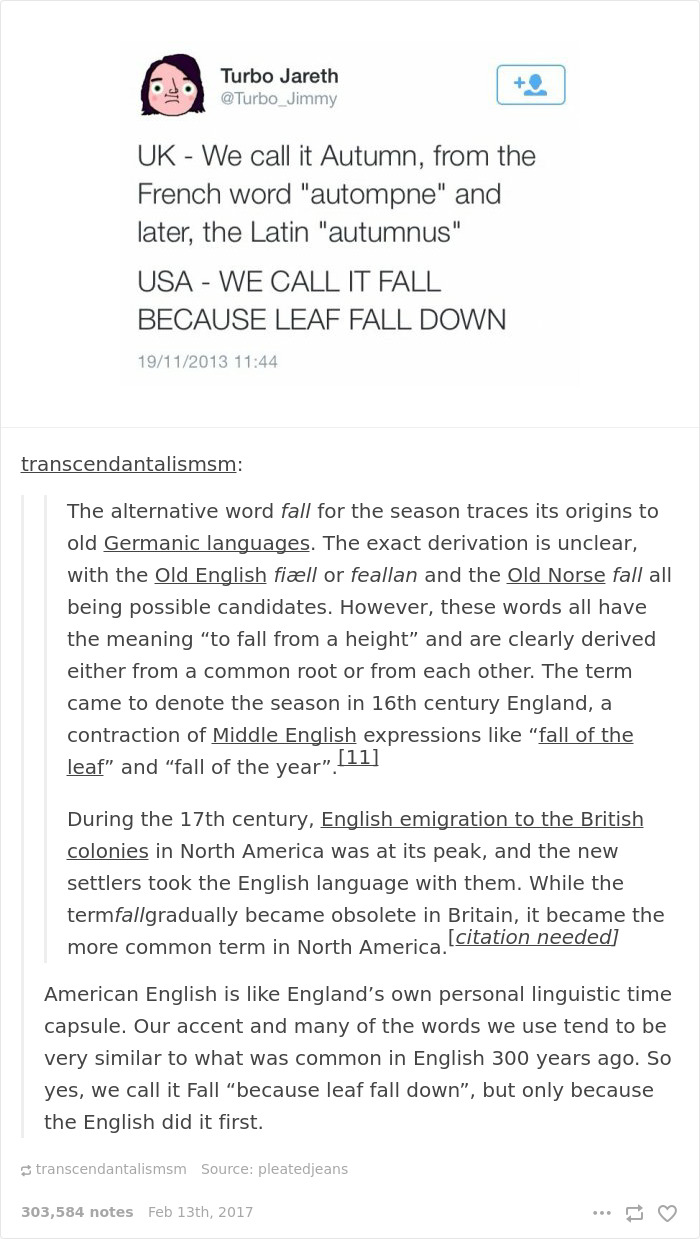
WORDS WITH THE SAME VOWEL STRUCTURE DON’T ALWAYS RHYME.
Cough, Though, Rough, Through all use the same “ough”, but are pronounced completely different. Why? We honestly don’t know. But hey, there’s always “Pony” and “Bologna”.
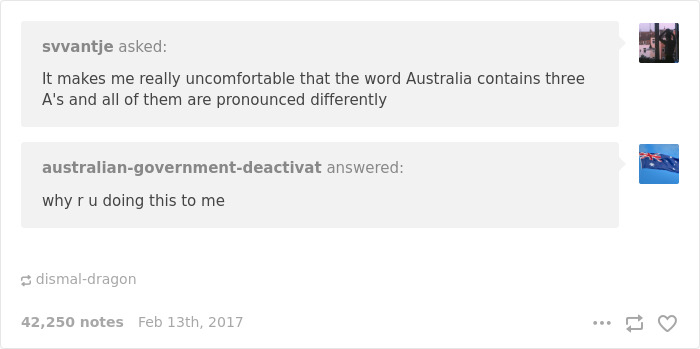
WE FOLLOW THIS COMPLICATED ADJECTIVE RULE WITHOUT EVEN REALIZING IT.
This is one of those weird english rules that we never break, even though we’ve probably never been explicitly taught it. When describing something, there’s a very specific order in which your adjectives go. Opinion, size, age, shape, color, origin material, purpose. It’s why “look at that square, adorable, little, purple, butterfly!” will never sound as good as “look at that adorable, little, square, purple butterfly!”.
CLUSIVITY IN THE ENGLISH LANGUAGE IS CONFUSING.
Clusivity is defined as “a grammatical distinction between inclusive and exclusive first person pronouns and verbal morphology”, aka the inclusive “we” and exclusive “we”. English is one of the few languages that does not have separate words for “we (that includes the listener) and we (that excludes the listener).

THERE’S AN EXPLANATION FOR WHY SOME WORDS ARE SPELLED THE SAME BUT PRONOUNCED DIFFERENTLY.
Get frustrated with “content” and “content” or “record” and “record” ? Well those pesky changes are actually alternating stress patterns, standard in English language and indicative of whether related words are nouns (first syllable is stressed) or verbs “second syllable is stressed). There’s a method to the madness!
THERE’S ACTUALLY A NAME FOR THAT SOUND THAT THE LETTERS “T-H” MAKE.
Words like “this” and “thing” have distinct “th” sounds, which is actually called a Dental Fricative. There are two types, voiced (like “this”), and voiceless (like “thing”). Interestingly, most languages do not have a Voiced Dental Fricative. – Courtesy piano.io

1) The bandage was wound around his leg to cover his wound.
2) The wind was too strong to wind the sail.
3) The dump was full, and had to refuse further refuse.
4) We must polish the Polish furniture.
5) He could lead if he would get the lead out.
6) The soldier decided to desert his dessert in the desert.
7) “No time like the present,” he said. “It’s time to present her the present.”
8) A large-mouthed bass was painted on the head of the bass drum.
9) Startled, the dove dove into the bushes.
10) I did not object to the object.
11) The insurance on the invalid was invalid.
12) There was a row among the oarsmen about who could row the best.
13) We were too close to the door to close it.
14) When does are near, a buck does funny things.
15) Not watching their steps, a seamstress and a sewer fell into a sewer.
16) On her farm, a woman worked to produce produce.
17) She wanted to sow, but her sow ate the grain; so she chose to sew.
18) Next, she hitched her cow to a plough to make a trough.
19) Then she decided to combine her combines.
20) That evening, she told her beau to go slow.
21) But she shed a tear when she saw the tear in her dress.
22) I had to subject the subject to a test.
23) How can I intimate this to my most intimate friend?
24) It might be wise to bow to a man with a bow.
25) John had to write to the right people to keep his rights during his rites.
26) The ewe with the flu knew who was due to get you through to the gnu with the number-two shoe, too!
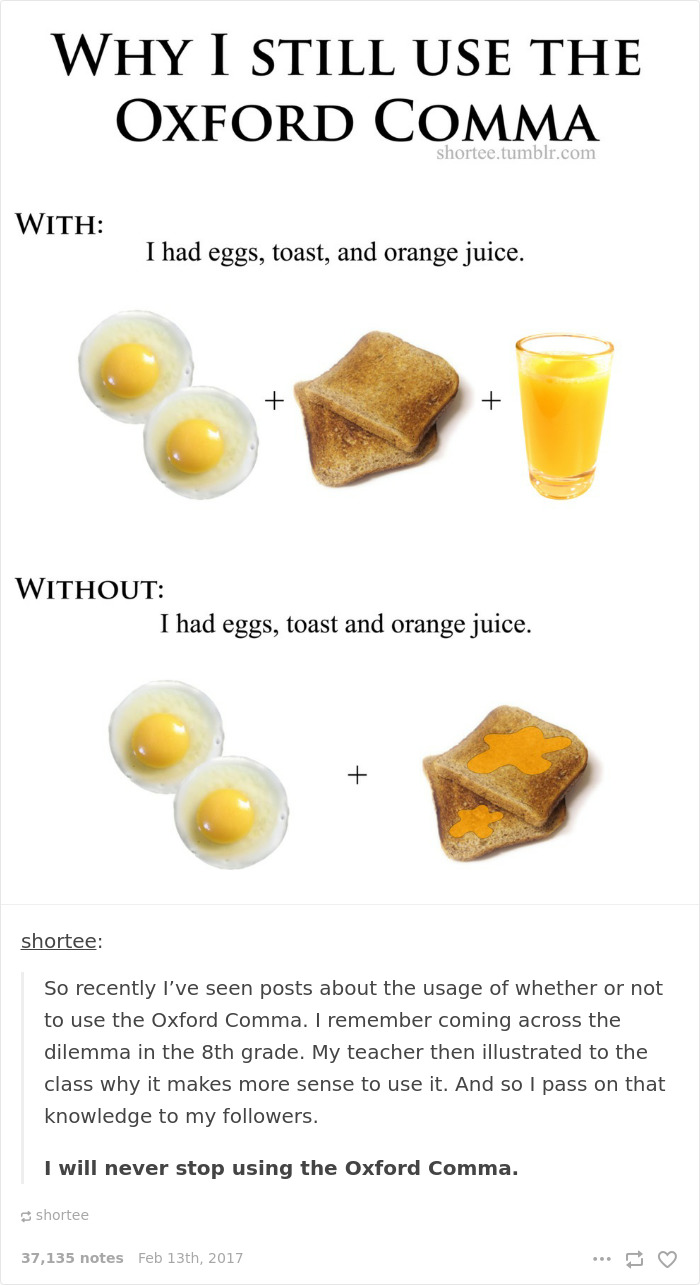
Hers’s 15 Weird English Words You Won’t Believe Exist!
- Kerfuffle (kəˈfʌf(ə)l)
Kerfuffle (noun) has been around since the early 1800s. There are two ideas as to how it came into English. It probably came from either Scottish Gaelic or from Celtic Irish, the languages that were used historically in Scotland and Ireland.
If somebody asked you the following question, would you know what they meant?
“What’s all the shouting for? Why are you making such a kerfuffle?”
It means to make a fuss or a bother, usually when people have different points of view. Imagine two of your friends having a minor disagreement over something and making quite a bit of noise – doesn’t kerfuffle sound like a great way to describe the situation? They might also be making a hullaballoo too…
- Hullaballoo (ˌhʌl.ə.bəˈluː)
“Did you hear all that hullaballoo in the office today?”
A word that really sounds like what it means, hullaballoo (noun) is the loud noises and shouting that people make when they’re angry.
It’s been part of the English language since the middle of the 18th century.
- Cacophony (kəˈkɒf(ə)ni)
Another word related to noise, a cacophony (noun) is a mixture of horrible sounds. Imagine birds screeching, alarm bells ringing and babies screaming…and you’ve got yourself a cacophony!
You may already know that words that end in phone or phony are related to sound in some way. Cacophony comes from a Greek word made up from kacos (bad) and phone (sound). It entered English in the mid 1600’s.
- Ragamuffin (ˈraɡəmʌfɪn)
Ragamuffin (noun) comes from the English that was used during the Middle Ages.
You’ve probably heard the word rag, right? A dirty and scruffy piece of old cloth. So it’ll make sense to know that a ragamuffin is a person who wears dirty and scruffy clothes – clothes that are just like rags! It’s usually used for children, and you may also sometimes hear it used to describe scruffy-looking animals.
The next time you hear someone say,
“I send my children to school dressed smartly, and they come home like little ragamuffins!”
You’ll know exactly what they mean!
- Whippersnapper (ˈwɪpəsnapə)
Nothing to do with whips or snaps, say whippersnapper (noun) quickly and you’ll create a funny and harsh sound!
Although this term is a little bit old-fashioned today, it’ll certainly make people smile if you use it. It’s been part of the English language since the 17th century and is a mixture of two terms. One referred to a lazy person who had no ambitions. The other term was used for young people who lived on the street and did bad things, like stealing and tricking people.
The meaning has changed over the years, and today it’s used for a young person who’s too confident and perhaps a little cheeky! It’s a perfect word to use for an inquisitive child who just can’t stop questioning and correcting their parents!
Would you giggle if you heard this conversation?
Mother: “Come here, please”
Child: “No, I’m busy”
Mother: “I asked you to please come here”
Child: “No. Dad said when people are busy you shouldn’t disturb them. So please leave me alone!”
Mother: “Well, you little whippersnapper!”
- Gobbledygook (ˈɡɒb(ə)ldɪˌɡuːk)
Close your eyes for a second and think of a turkey. What sound does it make? Does it sound something like “gobble, gobble, gobble”? That’s exactly where this word came from!
Created from the meaningless sound that turkeys make, gobbledygook (noun) was originally an American English word. It was created in the 1940’s to mean words that are nonsense or have no meaning. It also describes when people use too many technical words and so other people can’t understand what they’e saying.
“The Director was talking a load of gobbledygook in that meeting. I have no idea what he wants!”
- Gibberish (ˈdʒɪb(ə)rɪʃ)
Gibberish (noun) means the same: nonsense words and phrases that sound like English but have little meaning.
Gibberish is an older term than gobbledegook. It’s been in use since the mid 16th century. It’s not known where the word came from, but many people believe it was taken from either a similar Spanish or Swedish word.
Make sure you practice your English – you don’t want to talk gobbledegook and gibberish!
- Poppycock (ˈpɒpɪkɒk)
Have you ever listened to somebody trying to talk about something that they know absolutely nothing about? Like, you know that what they’re saying is completely untrue, yet they insist on continuing to talk? Or where someone has told you some so-called facts that are totally wrong?
It’s highly likely that they’re talking poppycock!
No laughing! Poppycock has nothing to do with poppies (a type of flower) or cocks (a male bird and a slang term for a man’s intimate body parts!)
Poppycock actually came from the Dutch word pappekak, which is made from pap (soft) and kak (poop!). It’s been part of English since the 1800’s.
A: “Hey, did you know that if you keep your eyes open when you sneeze your eyes will fly out?”
B: “What a load of poppycock!”
- Discombobulate (ˌdɪskəmˈbɒbjʊleɪt)
Mainly used in North American English, if somebody’s talking lots of gibberish, gobbledegook, and poppycock, they may be trying to discombobulate (verb) another person. You may feel a little discombobulated (adjective) by all these strange words!
Confused? You should be! Discombobulate means to confuse!
It’s been used since the mid 19th century, and is mainly used in a funny way.
“What’s the matter? You look a little discombobulated!”
- Flummox (ˈflʌməks)
If you’re now feeling very discombobulated you are also flummoxed (adjective)!
To flummox a person (verb) means to confuse them a lot.
It came into the English language in the middle of the 19th century. It was taken from dialects used in some parts of the UK.
- Curmudgeon (kəːˈmʌdʒ(ə)n)
Are you trying to find just the right word for someone who’s very bad-tempered and grumpy? Curmudgeon (noun) might be just the word that you’re looking for!
Dating back to at least the 16th century, this word has been used for a long time.
If you hear someone say,
“I don’t like our English teacher … he is a real curmudgeon!”
you can agree (or hopefully disagree!) and know what it means.
- Lackadaisical (ˌlakəˈdeɪzɪk(ə)l)
How about if you want to describe that someone’s lazy and has no enthusiasm or determination? Lackadaisical (adjective) would be perfect in this situation!
It’s been in use since the 1700’s, although where it came from isn’t clear.
For example,
“My sister has no job and is doing nothing to find one. She is so lackadaisical.”
- Woebegone (ˈwəʊbɪɡɒn)
Another terrific adjective. Can you guess what a woebegone person looks like?
It’s easy to break this word into two parts – woe (extreme sadness) and begone (an old-fashioned word that means surrounded by something). So, woebegone means “surrounded by sadness.” It comes from Middle English, English that was used during the Middle Ages.
The next time your friend looks sad, you can ask them,
“Why do you look so woebegone?”
- Lollygag (ˈlɒlɪɡaɡ)
What a fantastic verb: to lollygag! Nothing to do with lollies or gags, it actually means to be idle and lazy or to waste time. It’s most common in the USA. It’s not unusual to hear parents shout to their children to “stop lollygagging” – now you’ll know what they’re talking about!
The word has been used since the 1800’s. Nobody really knows where it came from though.
- Frankenfood (ˈfraŋk(ə)nfuːd)
Very new when compared to all the others on the list, the word Frankenfood (noun) came into existence in the 1990’s.
It’s used informally for genetically modified (GM) foods. GM foods are those that have been scientifically altered in some way, that haven’t grown naturally.
Frankenfood is a combination of the words Frankenstein and food. Frankenstein is a story about a scientist, Dr. Frankenstein, who creates a monster in his laboratory.
You might hear people say, for example,
“I’m not eating there! They use Frankenfoods!”

I came across this interesting piece by Dr. Albrecht Classen for The Department of German at the University of Arizona and reproducing it below.
It’s amazing that any of us ever learned English! THIS IS GREAT, and I’m sure it took a lot of work to put it all together! (I think a retired English teacher must have been bored.)
Let’s face it, English is a crazy language. There is no egg in eggplant, nor ham in hamburger; neither apples nor pine are in pineapple. English muffins aren’t English, nor are French fries French. Sweetmeats are candies, while sweetbreads—which aren’t sweet—are meat. We take English for granted, but if we explore some of its paradoxes, we find that quicksand is slow, boxing rings are square, and a guinea pig is neither from Guinea nor a pig!
Why is it that writers write and painters paint, but fingers don’t fing? Why don’t grocers groce, why don’t hammers ham, and why don’t dumpsters dumpst?
If the plural of tooth is teeth, shouldn’t the plural of booth be beeth? One goose, two geese. So—one moose, two meese? One mouse, two mice, means one house, two hice? And one index, two indices? If you have more than one ibex, why don’t you have ibices? Doesn’t it seem crazy that you can make amends but you can’t make just a single amend? If you throw out some odds and ends, but keep one item, is it an odd or an end? Which one is right to have left?

If teachers have taught, why haven’t preachers praught? If a vegetarian eats vegetables, then what does a humanitarian eat? Sometimes I think all the English speakers should be committed to an asylum for the verbally insane. In what kind of language do people recite at a play and play at a recital? Must we ship by transport and transport by ship? Who else has noses that run and feet that smell?
How can a slim chance and a fat chance be the same, while a wise man and a wise guy are opposites? You have to marvel at the unique lunacy of a language in which your house can burn up while it’s burning down, forms are filled out by being filled in, and an alarm that’s gone off is still going on.
English is a world where a woodcarvers magazine editor might add ads for adzes, and a chemist might use a vile vial. People can sit on a bough, though, and cough through the night as they re-read a red book to say they re-read it; and whomever finishes first has won one!
Why had the cops sought the sot? The photographers knot all fought for the shot—and not just for naught. Does the fuzz think there was proof of blood on a wood floor? And what was that word that occurred by the bird turd?
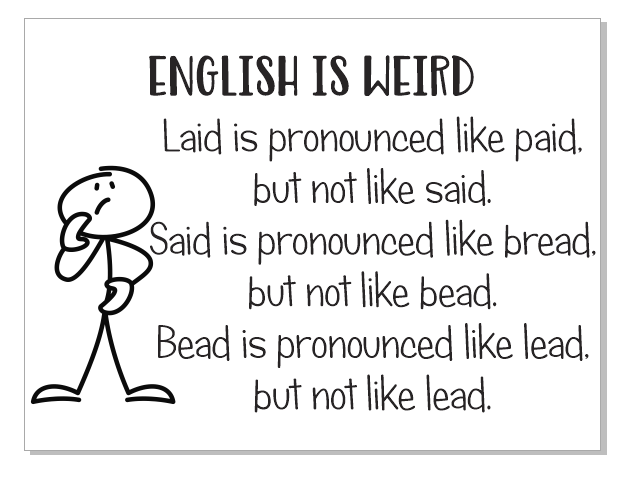
At the height of their leisure, neither had the sleight to seize the feisty weird sovereign poltergeist, so they had to forfeit the foreign heifer’s counterfeit protein.
English was invented by people, not by computers, and it reflects the creativity of the human race – which of course is not a race at all. That is why, when the stars are out, they are visible, but when the lights are out, they are invisible.
But please – could someone explain why “Buick” doesn’t rhyme with “quick”?

There is a two-letter word that has perhaps more meanings than any other two-letter English word, and that is the word “UP.”
It’s easy to understand “UP” as meaning “toward the sky” or “moving to the top” of something, but why do we wake UP in the morning (just before we get UP)?
At a meeting, we must speak UP in order to bring UP a topic. Then it’s UP to the secretary to write UP a report (unless she can think UP an excuse).
We call UP our friends and ask them to come UP for dinner. For them, we brighten UP the room, and we polish UP the silver, hoping they’ve worked UP an appetite. We mess UP the kitchen cooking UP a meal and using towels to soak UP spills. Afterward, we have to clean UP, and the next day, we warm UP the leftovers.

Sometimes, guys lock UP their house, line UP to buy parts, and then fix UP their old cars.
Politicians stir UP trouble, especially when they’re UP for election.
To be dressed is one thing, but to be dressed UP is something special!
A drain must be opened UP because it is stopped UP. If your can of Drano is empty, it’s all used UP.
We open UP a store in the morning, but at night we close UP shop.
If it looks like rain, we say it is clouding UP. When the sun comes out, we say it is clearing UP. When it rains, some things get wet and may end UP being all rusted UP. But when it doesn’t rain for a while, then everything dries UP. And in the winter, things can freeze UP!
We seem to be pretty mixed UP about “UP”! If you want to know more about “UP,” look it UP in the dictionary. It may take UP a fourth of the page, and can add UP to about thirty definitions!
If you are UP to it, you might try building UP your own list of the many uses of “UP.” It will take UP a lot of your time, but if you don’t give UP, you may wind UP with more than a hundred!
I could go on and on, but my time is UP. I’m going to wrap it UP by shutting UP!